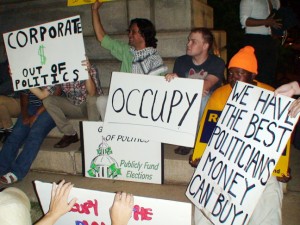Monthly Archives: December 2011
Tents at State House don’t merit emergency regs
“While camping out at the State House may not be a constitutional right, the governor is going about changing the regulations in a wrong and dangerous way,” said Brett Bursey, director of the SC Progressive Network.
Occupy Columbia protester works on his sign Dec. 18 at State House.
The governor is proposing to use the emergency regulations clause to bypass the laws (1-23-120) that require public notification, public hearings and legislative consideration for new regulations. The emergency regulations allow a state agency to have regulations approved immediately upon filing with the state Legislative Council. There is no public notice, no hearing and no legislative review of Emergency regulations.
“One would anticipate such an extreme measure to apply to plagues and natural disasters, not to tents on the State House grounds,” Bursey said.
Past emergency regulations have only been enacted by DHEC for imminent health threats to a community, or considered by the Department of Public Safety during a hurricane evacuation.
“We have an established constitutional process to make new regulations that mandates notice and public hearings,” Bursey said. “Through this process people may decide that ‘free speech camping’ is not allowed on state property, but neither the governor nor the Budget and Control board has that emergency authority. If the emergency regulation can be used in this fashion, there would be nothing to prevent the Department of Agriculture from suspending immigration laws to prevent the ‘imminent peril’ of peaches rotting in the fields as a threat to public welfare, or SLED from declaring union pickets a threat to public safety.”
It’s clear that the governor is more concerned with appearances and politics than with our state’s laws. “She doesn’t want tents on the State House lawn when the legislature returns in January or during the Republican presidential primary Jan. 28. While the governor may find tents on the lawn tacky, they hardly constitute an imminent peril to public welfare. One could argue that the imminent peril is that our democracy has been occupied by monied interests, and the tents on her lawn are a legitimate response.”
The SC Progressive Network suggests that the Budget and Control Board move on to part (B) of the governor’s request, which is to draft regulations for the use of the State House grounds through the established process.
The federal court admonished the state at a Dec. 14 hearing that the GROW v. Campbell decision of 1989 required the state to establish regulations regarding First Amendment expression on state property. Those rules were never codified. (GROW had permission to put a sign on the State House grounds opposing sending the SC National Guard to Central America, at a time when federal troops were banned. The rules were changed – the day the sign was to go up – to prohibit all signs. The court issued a directed verdict of guilty against the state and governor for changing the rules in order to violate GROW’s First Amendment rights. Part of the settlement was the promulgation of new rules.)
Bursey was director of the Grass Roots Organizing Workshop (GROW) when the organization successfully sued Gov. Carroll Campbell over his suppression of free speech on the State House grounds. In 1994 GROW organized the founding of the SC Progressive Network.
“For the past 22 years there has been an operative policy that you don’t need permission to exercise free speech on state property,” Bursey said. “With Occupy Columbia challenging the governor’s sense of decorum, it looks like we need to put the policy in writing.”
Walmart runs for president!
 In the immortal words of Mitt Romney, “Corporations are people, my friend.”
In the immortal words of Mitt Romney, “Corporations are people, my friend.”
Unlimited corporate spending on elections is the driving force in our democracy. Yet, there is a growing movement in this country to deny corporations the rights afforded to them by the Supreme Court of the United States. Los Angeles passed a resolution declaring that corporations are not people and money isn’t speech.
South Carolina Democrats want to put a resolution on the ballot asking the public to vote on corporate personhood. There are even people who would blame the lingering recession and growing inequality in our society on major corporations.
That is why, today, I am officially announcing my candidacy for president of the United States. It’s time to take a stand and fight for those who have come under so much attack in recent months: the 1 percent. They need a strong voice in this race, and as America’s largest private employer and the world’s largest retailer, with over $480 billion in revenue in 2010, I am that voice.
Some might scoff at such a notion, since no major corporation has ever even been elected to Congress. But this is America – where corporations are considered people and any retail conglomerate can grow up to be president.
Please take a moment to check out my web site.
SCANA skates on taxes
By Brett Bursey
SC Progressive Network
South Carolina’s only Fortune 500 company, SCANA, paid less than 1/10th of one percent in state income taxes between 2008 and 2010, according to a new study. In 2009, SCANA paid no taxes on over a half-billion dollars in profit.
Citizens for Tax Justice just released the study “Corporate Tax Dodging in the Fifty States, 2008-2010” which found that 68 consistently profitable Fortune 500 companies paid no state corporate income tax in at least one of the last three years. The 265 companies profiled in the study made a total profit of $1.329 trillion, and paid an average of 3 percent state corporate income tax.
SCANA paid $1 million in taxes on $1.590 billion in profit during the three years the study covers.
SCANA Corporation is a $9 billion Fortune 500 energy-based holding company, based in Cayce, SC, whose businesses include regulated electric and natural gas utility operations and other energy-related businesses. SCANA’s subsidiaries serve approximately 610,000 electric customers in South Carolina and more than one million natural gas customers in South Carolina, North Carolina and Georgia.
According to the Sunlight Foundation’s new Influence Explorer web site, SCANA made $677,835 in campaign contributions (73 percent to Republicans) and paid $3,340,000 to their fleet of lobbyists during those three years.
While South Carolina’s corporate tax rate of 5 percent is lower than in 39 other states that tax corporate income, South Carolina’s most profitable company is paying only .02 percent on their profits.
Someone please tell Gov. Nikki Haley and the Taxed Enough Already crowd that SCANA’s corporate stockholders are laughing at them — all the way to their bank in the Cayman Islands.
SC immigration law is inhospitable
By Jo-Dee Robinson
Summerville, SC
I am wearing an orange ribbon today because I am afraid. I am a citizen and I am afraid. I fear the change of heart that happens when we legitimize racism in a law such as Senate Bill 20.
I am American born, but I am a Latino. My parents, who immigrated from Cuba, have been proud taxpaying citizens far longer than most of the voices in our current immigration debate.
Yet very often in a state known for its Southern hospitality, the moment I speak Spanish, I am treated differently. The new S.20 immigration law will mean for my family of citizens that we will run the risk of being profiled, detained and investigated because of the color of our skin and our accents. Yet I truly doubt that my Anglo husband will be asked for his papers.
What will happen the day my elderly mother visits us and we encounter the police? I fear that should she leave her license at home, she will be locked up for status investigation and I for “transporting and harboring,” a felony.
First of all, I don’t have time for all that, and neither do our local police who bounce from one service call to another protecting our communities. I don’t want them all tied up at the jail; I want them patrolling my street.
But what I am really concerned about is what happens in the hearts of all of us after that encounter. All of us will suffer a blow to our dignity. You strip me of my identity and sacred worth when you racially profile me. And by removing the ethical fences that resist racial profiling, you taint the dignity of our police officers who work so hard to do their job in a moral and ethical manner.
This kind of encounter that will be law on Jan. 1 is dehumanizing and will be experienced repeatedly by those who look and sound different. Written in between the lines of S.20, and I fear soon on our hearts, is the growing sentiment that says, “If you are foreign, we don’t want you.”
Yes, we have pressing need to address our immigration issues, but regardless of where you are on the position of immigration, certainly you do not intend to send a message to our immigrant citizens and legal residents that they are no more than a profile. Our state still has not healed from the scars of racism, and I fear that S.20 will tear open and re-infect those wounds, while creating new ones.
I was always taught growing up that America is a melting pot. Let’s be honest. Unless we are Native American, we are all immigrants, invaders, or whatever term we wish to use nowadays. As I wear my orange ribbon, I am asking for a better way.
What I am asking in the midst of my fear of S.20 is can we, for a moment, set aside our labels and just be human?
It is no longer a question of law, but of heart. Ultimately, it is our Southern hospitality that is on trial.
Perk up the economy
By Hoyt Wheeler
Columbia, SC
Why Occupy Columbia? In short, because trickle- down economics has it all wrong. Instead of an economic system in which wealth drips down from the wealthy to everyone else, we should have one in which wealth in the lower reaches of the economy percolates up to enrich the entire economy. Increased demand for goods from millions of American consumers can come only from increased consumer confidence. Increased confidence can come only from higher wages, greater security in old age, and a lack of fear of financial devastation from health problems.
It is the failure of trickle-down economics, along with the failure to sufficiently regulate the financial manipulations of Wall Street, that have prompted the Occupy movement.
The problems in the American economy are not difficult to see. The average American worker’s pay, after inflation, has been essentially flat since 1980, in spite of the economy doubling in size. The unemployment rate hangs stubbornly high at around 9%. The national poverty rate in 2010 was 15.3%, up from 14.3% in 2009, and 46.2 million Americans were living in poverty, up from 42.9 million. Families with young children have a 37% poverty rate, the highest number on record.
In contrast to the situation of the vast majority of Americans, the wealthiest among us are doing quite well. The wealthy are richer than ever, taking home the largest slice of wealth and income in the last 75 years (over 40%), and paying the lowest rate of taxes in 30 years. CEO salaries went up an average of 23% between 2009 and 2010, compared to an increase of 0.5% for the average employee. It is clear that the rich are getting richer. Wealth has become highly concentrated. What is especially offensive is that the fat cat denizens of Wall Street, whose irresponsible behavior is chiefly responsible for a massive financial crisis, have been bailed out with our tax money. For more facts underlying the current protests, see businessinsider.com.
So, what is to be done? The answer of the Republicans and conservative economists is to let the market work its magic. The fact that the market often produces disastrous results for the majority of our citizens is of no consequence, since it is believed with religious fervor that any attempt to interfere with its sacred “invisible hand” will only make matters worse. The historical record reveals, however, that unfettered and unregulated markets have a disagreeable tendency to have periodic crises that produce great suffering by the general public.
Assuming that we can adopt policies to alleviate the unfortunate effects of our economic system, what might these policies be? Obviously, it would help to increase the demand for labor. But labor demand is derived from the demand for its products. To achieve greater demand for products means putting greater financial resources into the hands of consumers, and their having willingness to spend them. Cutting taxes is always a popular method of doing this, but it involves cutting services that are more needed in times of economic distress, and are also needed to have long term prosperity. Cuts in education are a classic example of this.
Fortunately, the money is available. The huge hoards of cash being held by U.S. companies need to be placed in circulation for the economy to recover. There is currently a record $1 trillion squirreled away by corporations. If this large stash of funds were put in circulation, especially in the form of wages, it would stimulate the economy as well as make for better lives for millions of workers.
During the Great Depression the U.S. government adopted a number of policies that had the purpose of increasing demand for products and therefore increasing the demand for labor. In the National Labor Relations Act of 1935, Congress declared that: “The inequality of bargaining power between employees who do not possess full freedom of association or actual liberty of contract, and employers who are organized in the corporate or other forms of ownership association… tends to aggravate recurrent business depressions, by depressing wage rates and the purchasing power of wage earners in industry… It is hereby declared to be the policy of the United States to…encourage the practice and procedure of collective bargaining….” Unionized workers earn higher wages, have better health insurance and better pensions. Yet, this purpose has been frustrated in recent years by the lack of teeth in the law and the inability to strengthen it to respond to modern conditions. To the contrary, at present the National Labor Relations Board, which administers this law, is under vigorous attack by the political servants of American capital.
The enormous political power of Wall Street prevented the adoption of sensible reforms in the financial system, such as the “Volker Plan” that would have separated traditional banking and speculative financial activity. This should be changed. There are a number of changes in the tax code that would make for a more equitable system as well as produce needed revenue. A small tax on financial transactions is only one of these.
It should not be surprising that on New York’s Wall Street, and in Columbia, and a number of cities across the country, Americans are taking to the streets. The people are finding their voice.
Hoyt Wheeler is Distinguished Professor of Management Emeritus, Moore School of Business, University of South Carolina. His publications include The Future of the American Labor Movement and Industrial Conflict: An Integrative Theory. He is a Co-Chair of the SC Progressive Network. The opinions expressed here are his own and do not necessarily reflect the views of the Moore School of Business, the University of South Carolina or the SC Progressive Network.




